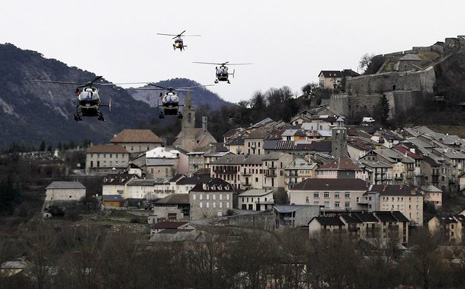errorism Unlikely in Germanwings Crash, French Officials Say

Lufthansa, the parent company of Germanwings, has characterized the crash as an accident. But as investigators reviewed one of the plane’s so-called black boxes, unanswered questions remained, including why the aircraft had descended for eight minutes before crashing, and why an aircraft with a good safety record had crashed in largely clear weather.
Speaking on the French radio station RTL, Interior Minister Bernard Cazeneuve said on Wednesday that terrorism was “not a privileged hypothesis at the moment” but that no theories had been definitively excluded.
Mr. Cazeneuve said the size of the area over which debris was scattered suggested that the aircraft had not exploded in the air but rather had disintegrated on impact.
He said that the plane’s cockpit voice recorder, the black box that had been recovered, was damaged but that investigators expected to be able to recover the conversations stored on its memory chip “in the coming hours.”
Those conversations were the main piece of hard evidence that investigators had to work with as they tried to shed light on the circumstances surrounding the crash.
One of the main outstanding questions is why the pilots did not communicate with air traffic controllers as the plane began its unusual descent, suggesting that either the pilots or the plane’s automated systems may have been trying to maintain control of the aircraft as it lost altitude.
Among the theories that have been put forward by air safety analysts not involved in the investigation is the possibility that the pilots could have been incapacitated by a sudden event such as a fire or a drop in cabin pressure.
A senior French military official, who spoke on the condition of anonymity because the investigation was continuing, said that the lack of communication from the pilots during the plane’s descent was disturbing, and that the possibility that their silence was deliberate could not be ruled out.
France’s air accident investigation bureau was expected to hold a briefing at its offices in Le Bourget, near Paris, on Wednesday afternoon. The agency, which is leading the technical inquiry into the crash, sent seven investigators to the crash site on Tuesday. They have been joined by their counterparts from Germany as well as by technical advisers from Airbus and CFM International, the manufacturer of the plane’s engines.
Speaking on Europe 1 radio, Jean-Paul Troadec, a former director of the French air accident investigation bureau, said that the analysis of the cockpit voice recorder would “help us to understand what happened in the final minutes of the flight.”
“Nonetheless,” he added, “just having these recordings is not going to be sufficient” to make any definitive conclusions about the cause of the crash — a process that could take weeks, if not months.
A preliminary transcript of cockpit voice recordings was expected to be available to investigators by Wednesday afternoon.
Mr. Troadec said the voice recordings would need to be synchronized with the contents of the second black box, the flight data recorder, which tracks roughly 1,300 statistics, including the plane’s position, speed, altitude and direction. Locating that recorder remained a priority for search teams.















































